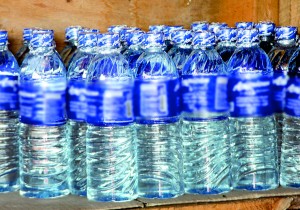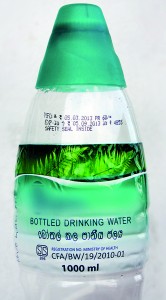News
Do you know what’s in that bottled water?
View(s):By Charundi Panagoda
Whether at a five-star restaurant in Colombo, at a neighbourhood kade or even backpacking though the countryside, locals and tourists alike rely on bottled water. However, Public Health Inspectors (PHIs) warn that they may not be as safe as you think.
Last week, PHIs in the Eastern and North Eastern Provinces seized some 4,000 to 5,000 bottled water items carrying expired or falsified Ministry of Health (MoH) registration numbers.
Bottled water must carry a registration number provided by the Health Ministry, which guarantees that the product meets health standards. This has to be renewed every three years. The month and year the registration number was issued is indicated at the end of each number, therefore, any bottled-water product that has an issuing date on or before March 2010 cannot be on store shelves this month.
“We took a number of products off the shelf for having either expired registration numbers or made-up registration numbers,” Public Health Inspectors Association of Sri Lanka Secretary A. M. Senarath Bandara said. “Consumers, unless they carefully scrutinise, would not be able to spot these.”
Most of the problematic products were found in Trincomalee area, Mr. Bandara said, with company addresses in Kandy or Gampaha. Mr. Bandara did not disclose the brand names as the court cases were still pending.
The practice has also been thriving in the Puttalam area due to drinking water problems in the region. Water is mostly collected from deep wells in the town, very few in the area where the water isn’t brackish, and are sold cheap to coastal residents in big cans. PHIs are reluctant to apprehend these businessmen because, they claim, doing so would deprive area residents of drinking water.
People continue to buy bottled water, distrustful of tap water or coastal residents preferring to pass on local brackish water, in the process making the bottled water industry huge.
Bottled water that comes with the “purified” label means that the water has been processed to remove chemicals such as chlorine and a majority of dissolved solids, such as magnesium. The water is then treated with processes such as distillation (boiling the water and then condensing the steam into a clean container,) carbon filtration (using activated carbon to remove organic compounds or sediment), or ultraviolet filtration (for disinfecting) among some. If the product is mineral water, then the water, typically from a spring, contains dissolved solids like calcium or sodium.

A bottle of water of a leading bottled water company, with date of manufacture as March 5, 2013 and purchased last Friday bears an expired MOH registration number
With the success of the bottled water industry come a string of dubious manufacturers who would bottle tap water and call it “purified drinking water.” Former Laboratory Services Chief at the Water Supply and Drainage Board, Sunil Fonseka said certain businessmen thought it “nothing” to fill discarded plastic bottles, with the brand label intact, with tap water, reseal with a candle and sell as new at train stations or bus stands. One consumer noted such practices at the Maharagama Cancer Hospital, where throngs of sullen customers bought bottled water for their sick kin, barely noticing the products they purchased were not properly sealed.
“Bottled water is made to be kept for a long time. Overtime, chemical reactions happen inside the bottle. For example, if we chlorinate residual organic compounds in bottled water, overtime it becomes carcinogic. If someone refills bottles with public tap water, which certainly contains chlorine, it’s like feeding people poison,” Mr. Fonseka said.
In a move to curb the dubious products from entering the market and regulate the thriving industry, the Health Ministry issued a gazette in 2005 making it mandatory that all bottled water manufacturers obtain a certification of registration with the Food Control Administration Unit (FCAU).
Obtaining registration can be an arduous process, FCAU does a number of chemical and microbiological tests on the source of water, the finished product as well as making sure the plastic used for the bottle is food grade.
In addition to the MoH registration, though not compulsory, genuine manufacturers can also obtain a Sri Lanka Standards (SLS) certificate, usually done parallel to obtaining MoH registration. The SLS process takes longer and costs manufacturers about Rs. 100, 000.
“We check if the bottled water source is suitable, if the water is not contaminated, for example with pesticide or human waste. We do a geological survey on how much water can be extracted per day, environmental sustainability and microbiological and chemical tests on the finished product. If these standards are met, we check the treatment facilities, health certificates for workers, food waste certifications and so on,” Sri Lanka Standards Institute Product Certification Director Nayana Satharasinghe said.
Currently, there are 75 MoH registered bottled water brands in Sri Lanka, and 55 of them also have SLS certification.
Regardless of registration, some bad products still end up in the market. In 2009, Medawachchiya police arrested a man for refilling used plastic bottles with well water and selling it as “purified” water. FCAU Assistant Director H. Thilekarathne said, though the agency has a “good surveillance system,” everything cannot be controlled from the center. He admitted there were “legal loopholes” in the current registration system and the agency is in the process of rectifying them.
“According to the existing regulation, we haven’t introduced a re-registration system. Some manufactures may use this as an opportunity to continue without registration,” Mr. Thilekarathne said.
Mr. Fonseka said the biggest shortcoming in regulating the bottled water industry was the lack of a systematic monitoring mechanism. Mr. Thilakarathne said MoH “certainly” monitors the production sites and finished products and both SLSI and MoH claimed they “occasionally” carry out market surveillances to ensure the safety of the final product. However, Mr. Fonseka claimed, island-wide sampling was still awry. “This is a huge, profit-minded industry. There are genuine manufacturers but some only care that the end product is visually clean, that is no residue is visible. They can short-circuit the system, claim the water source is one and have a secondary water source elsewhere. Therefore we need an independent body to scrutinise this industry,” Mr. Fonseka said.
Follow @timesonlinelk
comments powered by Disqus



















